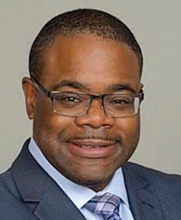Black Adults Who Live with ADHD
Napoleon Higgins, MD, interviewed by Melvin Bogard, MA
Attention Magazine October 2021
Download PDF
Melvin Bogard, MA, interviews Napoleon B. Higgins, Jr., MD
 Black adults with ADHD face barriers when seeking diagnosis and treatment for ADHD. There are cultural concerns that need to be addressed for them to receive proper evaluation and effective treatment.
Black adults with ADHD face barriers when seeking diagnosis and treatment for ADHD. There are cultural concerns that need to be addressed for them to receive proper evaluation and effective treatment.
Earlier this year, CHADD’s All Things ADHD podcast featured an important conversation between Dr. Napoleon Higgins, a psychiatrist from Houston, Texas, and Melvin Bogard, CHADD’s director of multimedia content. They talked about mental health stigma within the Black community, the cultural values that may impact treatment, and ways to address these issues. Dr. Higgins provided resources to help Black adults find culturally competent providers, and strategies they can use to help providers better understand their challenges. We’re honored to bring you selections from the podcast, edited for length and clarity.
MELVIN BOGARD: Many Black people struggle to talk about mental health issues with their families out of fear of being shamed or not taken seriously. My questions are, how do we talk about ADHD to family members, and how do we address the stigma and mental health issues in the Black community?
NAPOLEON HIGGINS: One, it’s important to be able to receive support and care from your family members and people who love you. If you already know that they’re not going to be supportive, there’s not always a need to even let them know, especially if it’s going to be painful and detrimental to yourself to do that. Now, if you’re very ill or very sick and you’ve got to say something to somebody, definitely do so. The experience of ADHD and treatment really does impact the entire family, so I would prefer an individual to be able to share that, but if you’re in a situation where you can’t, you may not want to.
The other thing to consider, though, is that because ADHD runs in families, if you’re dealing with it, chances are that somebody else in your family also has ADHD, and by not letting them know and not discussing it, it can cause another individual to be suffering needlessly, or at least to have a lack of understanding of what’s going on.
Stigma is a huge problem, and it causes a lot of barriers to treatment and care. Stigma typically comes out of ignorance, just a lack of knowledge and information, and then you hear bad knowledge and bad information. That drives further the stigma and the fear of mental health. Too often, we look at mental health as something to ridicule and do not understand that mental health is a physical health problem. It is the issues that affect the mind and the brain. Just like you have other organs in your body, like your liver and your heart and your lungs and your skin, you also have a brain, and a brain has illnesses that change how people behave, because your brain actually drives behavior.
So, the point in receiving mental health care is that my brain is having an issue with how it’s seeing things, how it’s perceiving things, or even how I’m acting, my actions, or even what I’m saying. You go and see a doctor that helps you. Sometimes it requires medications, sometimes it doesn’t.
Too often, I find in communities—all communities, but specifically the Black community—so often people believe they have some sort of character flaw. When it’s more of a neurobiological issue that is causing them not to be able to focus, not to be able to pay attention, possibly be hyperactive, be impulsive in their decision-making—those are things that are treatable. Sometimes behavioral management, sometimes medication, but we’ve got to get past the stigma and get more towards the knowledge, because too often people suffer because of the lack of knowledge.
Let’s talk about masking and code-switching. What’s the difference between the two, and do you feel that Black people with ADHD have an additional layer of masking or code-switch because of their ADHD?
Well, it’s hard to say. When you look at masking, like masking yourself and how you behave around the dominant culture, and then code-switching so far as being able to go between your culture and the dominant culture, we all do it. We all do it to an extent, and it’s not even always according to race. There’s a different way that I’m going to act around my homeboy versus act around my mom. There’s a different way that I would even act around my homegirl back in the day versus the way that I would probably act with her in front of my wife. It has nothing to do with intimate relationships at all, it’s just the flow of your relationship with a particular person.
It can change from room to room, and immediately if needed, but when it comes to race, we have to switch up according to the dominant culture. I saw this recently in an interview where I didn’t realize a friend had started filming when I got on the interview. When we were talking, we were talking as colleagues, as friends for well over twenty years, and so my vernacular and even my movements were very different. Once I figured out the camera was on, everything switched and changed. Even though I’m talking to the same person because the camera is on and now, we’ve gone from a friendly, casual, to a professional conversation, the code switched. It’s not even mentally thought of, it just does.
We tend to have to do that. ADHD tends to be neurobiologically a little bit different. I would say it could be an advantage or a disadvantage. Oddly enough, they tend to have the gift of gab because they can switch and change on a dime with whatever’s going on at the time. Now, the other problem with that is that sometimes they will forget where they were and switch back out and not realize it, and then go into, for lack of a better term, Ebonics nature, or whatever may have happened because you just switched right out. It could be an advantage, but it could be a disadvantage as well.
Should individuals disclose their ADHD diagnosis to their employer? And considering the fear of implicit bias and stereotypes, should Black people with ADHD disclose their diagnosis in any way?
Generally, I probably would not, not unless it is needed. Obviously if I’m filling out a form or something or getting a license and I need to disclose, I would recommend that you disclose at that time. In general conversation, no, because people can start to believe things like, “Well, he did that because he’s ADHD,” or “She did that because of this particular diagnosis” and start to make excuses for you, which is not always good, but also they say, “Well, we don’t want to put them on this important project because they can’t focus or pay attention.” I would normally leave that out. Maybe the company dropped our insurance, I can’t take my medication, and now it’s directly affecting performance of my work, and now I need to make an excuse for what’s going on, but generally I would leave it out unless it was necessary.
Realize that anything you say can and possibly will be used against you, be it mental health or any other thing that is going on with you. So, I would be careful about who I share any mental health or physical health diagnosis with. Now, of course, if this is your close friend and you want to share, that’s up to you, but you have to judge it on an individual case-by-case basis. Or maybe if you want to put on a T-shirt that says, “I have ADHD,” in order to promote the information and let people know so it could help somebody, I would do that on your own time, but not necessarily in a work situation. It depends on the individual and the circumstances with the individuals they’re working with.
What if I needed accommodations in the workplace?
Typically, I would run that through HR. With the work done by CHADD and many others, the attitudes about ADHD seem to have gotten better, and people are more understanding and more willing to accommodate.
Let’s talk about cultural competency. There’s an article titled, “Culturally Competent Strategies for Assessing and Treating ADHD in African American Adults.” It states that providers must explore patients’ and families’ historical concepts as being history-sensitive in a fundamental way to reduce African Americans’ cultural mistrust of the mental healthcare system. Do you agree that this is a helpful course of action for providers?
Well, I would say definitely any time you consider culture, it’s a good idea. It’s not anything to run from, it’s something to run into. Fact is that people say, “Well, I don’t see race.” Well, realize there are disparities in how individuals think about other individuals that we have been taught. We’re living in a racial construct. So, “I don’t see color.” Well, I know I’m not clear. If you see a patient with pelvic pain, you need to take into account whether or not this is a man or a woman. It tells a different story. Your treatment and your outcomes are going to be different based upon what you see in front of you.
 It’s always important to make sure you pay attention to race, because there are disparities and they are based upon race. Too often, Black young men, they’re more likely to be diagnosed with conduct disorder or oppositional defiant disorder. A young Black woman who is inattentive who’s struggling in school may be perceived as being slow. Well, this person could have a very high IQ, but cannot pay attention to what’s going on in front of them, and so therefore we ought to think, “Well, maybe her parents are not people who are professionals,” when making this judgment.
It’s always important to make sure you pay attention to race, because there are disparities and they are based upon race. Too often, Black young men, they’re more likely to be diagnosed with conduct disorder or oppositional defiant disorder. A young Black woman who is inattentive who’s struggling in school may be perceived as being slow. Well, this person could have a very high IQ, but cannot pay attention to what’s going on in front of them, and so therefore we ought to think, “Well, maybe her parents are not people who are professionals,” when making this judgment.
The point is you want to make sure that you’re culturally competent in everything that you do in order to ensure that you have good outcomes, but you always want to address your own biases. I can’t change that I’m a Black man in America, and so I would not want a doctor who walks in the room to see me to say, “Well, I’m going to change that. He’s not going to be a Black man in America when he’s in my office.” No, no, no. That’s not smart. What I need the doc to do is, do your own work, that this is a Black man in America. He’s coming to see me at the age of mid-to-late forties. Therefore, there are health disparities, and he’s more likely to be dead in the next twenty years than a white patient coming in with the same age and the same level of income and the same insurance. That needs to be taken into account when I walk in the room.
The same thing with ADHD. The impact of ADHD on a Black individual from childhood, who’s now an adult: missed opportunities. If he did not finish high school and he is twenty years old and he has not been incarcerated, chances are he’s going to be incarcerated in the next three years, alright? I need you to take those things into account in your decision-making and understand the acuity of the situation that, “I have a twenty-year-old Black male who’s dropped out of high school who’s in front of me with his mom trying to get help for ADHD.” That is a very powerful thing that’s very different, can be very different than somebody of another nationality or of another race.
Their race, the income, the resources, or their mom’s education, if she has a master’s, then her knowledge level maybe or probably is a lot different than the understanding of ADHD of a mother who dropped out of school herself who’s on financial assistance from the government. We’ve got to take all of that in, because it’s not just the diagnosis of ADHD, it is all of those things coming together, which helps to formulate what the story is, and formulate a treatment plan. We’ve got to be careful, though, we don’t want to make assumptions about the individual. That’s why you want to dig deeper and ask questions so that you could have a better understanding and a better outcome.
How do you locate culturally sensitive doctors that diagnose and treat ADHD?
Well, the biggest thing that you could do is make sure that you research the information yourself. Most doctors do not have a problem with an individual doing research. Now, every once in a while, people will be stuck just knowing that Google is a better doctor than the person. “The last twenty minutes I spent on Google is worth the last twenty years that he spent in school,” but we’ve got to make sure we have the right perspective. An educated individual honestly tells me that they’re interested in their care, all right? So, the better you are informed, the more in-depth conversation that we can have. We need to be informed as much as we can.
If you feel like the doctor is not getting it, and not getting you and not understanding you, let the doctor know. That’s not a tragedy that I missed something that I should have known. Let the doctor know, “As a woman, I feel like you’re not getting what I’m saying when I talk about my trauma and dealing with my husband.” And for me, if you tell me that, I’m not mad about it; I’m like, “Please let me know, because this may be the breakthrough we need to do in order for you to get better.” Most doctors are going to be okay with you sharing information or letting them know, and if you let me know if I have a blind spot, I want to plug the blind spot. There’s no such celebration of staying blind.
Very few doctors would, I would say, even argue with you that, “I don’t think you’re seeing my issue with race and how it’s impacted me.” I don’t think any are going to say that… No, there will be somebody. But the greater majority are not going to say, “No, we’re going to disqualify race today. Race doesn’t matter to you or me or your diagnosis of this situation.” If you have a doctor that said that you definitely need to keep it moving. But most are going to be very interested.
According to research, minority patients benefit from having minority doctors, but there is also a shortage of Black doctors in America. Realistically, what are the chances of being cared for by a Black physician, and should it really matter if the provider is of another race or ethnicity?
Anywhere from 2% to 4%, sometimes around 5% of psychiatrists are Black, realizing that the American population is about 13% Black. Every Black person will not be able to get in to see a Black psychiatrist. Like they have food deserts, you’ve got Black psychiatry deserts where there is just no one there, or at least no one knows how to find them there. If you know a Black doctor, ask another Black doctor, even if they’re of another specialty, there are medical societies. Normally it’s more or less word of mouth. Google “Black psychiatrist” in a particular area. CHADD has a website. Psychology Today is a very good website that allows you to pick race, area, city, zip code, and things of that sort. Now, at the same time, that does not mean that your doctor in front of you is not doing an excellent job. You may need to do work with the person that you’re with, and most people are professionals who are going to try to do their best. If there’s something that they’re missing, they want to know. If you’re getting excellent care, I would not recommend switching your doc if you’re getting excellent care. If you’ve got questions about it, then research, read, and you may even want to get a second opinion, but make sure that you reach out and find someone, even if you can’t find someone Black.
What advice do you have for Black adults who are newly diagnosed?
For those who are newly diagnosed: education, education, education. The more you know about your diagnosis, the more you do more introspection and understanding of yourself, the better for everybody. That’s better for you, and so you know what’s going on, but it also helps you be able to communicate with your doctor better. If you know more about your diagnosis, more about the symptoms, as much as you know about the medications, that’s better for the doctor because we have a higher level of dialogue, and you can get to optimal functioning.
Is there anything else you would like to say before we end?
So far as the African-American community, I would say the biggest issue that we tend to have is a lack of knowledge, and the importance of treatment, how it affects you through childhood all the way through adulthood, and how we all can get better. Knowledge is key. I appreciate you today for bringing that knowledge to the front.
This podcast is supported by Cooperative Agreement Number NU38DD000002-01-00 from the Centers for Disease Control and Prevention (CDC). The contents are solely the responsibility of the authors and do not necessarily represent the official views of the CDC.
Listen to the full interview at https://podcasts.chadd.org/e/black-adults-living-with-adhd/.
 Napoleon B. Higgins, Jr., MD, is a child, adolescent and adult psychiatrist in Houston, Texas, and owner of Bay Pointe Behavioral Health Services and South East Houston Research Group. He is the president of the Black Psychiatrists of Greater Houston, past president of the Caucus of Black Psychiatrists of the American Psychiatric Association, and past president of Black Psychiatrists of America. The coauthor of a number of books, including How Amari Learned to Love School Again: A Story about ADHD, Dr. Higgins also specializes in nutrition and health to improve his patients’ mental and physical lives. He has worked with countless community mentoring programs and has special interest in trauma, racism, and inner-city issues and how they affect minority and disadvantaged children and communities.
Napoleon B. Higgins, Jr., MD, is a child, adolescent and adult psychiatrist in Houston, Texas, and owner of Bay Pointe Behavioral Health Services and South East Houston Research Group. He is the president of the Black Psychiatrists of Greater Houston, past president of the Caucus of Black Psychiatrists of the American Psychiatric Association, and past president of Black Psychiatrists of America. The coauthor of a number of books, including How Amari Learned to Love School Again: A Story about ADHD, Dr. Higgins also specializes in nutrition and health to improve his patients’ mental and physical lives. He has worked with countless community mentoring programs and has special interest in trauma, racism, and inner-city issues and how they affect minority and disadvantaged children and communities.
 Melvin Bogard, MA, is CHADD’s director of multimedia content development. He is passionate about supporting and empowering marginalized communities, fighting for social justice, and reducing ADHD stigma by leveraging social media platforms as a conduit to learn and meet these communities’ needs and distribute resources.
Melvin Bogard, MA, is CHADD’s director of multimedia content development. He is passionate about supporting and empowering marginalized communities, fighting for social justice, and reducing ADHD stigma by leveraging social media platforms as a conduit to learn and meet these communities’ needs and distribute resources.
Other Articles in this Edition
Resilience and ADHD During the Pandemic
Challenges in ADHD Care for Children of Color
PART ONE
Pay ADDention™! I’m a Teen Expert on ADD
Study Skills for Thriving with ADHD
Raph’s Tale, A Fable About Neurodiversity
Black Adults Who Live with ADHD
